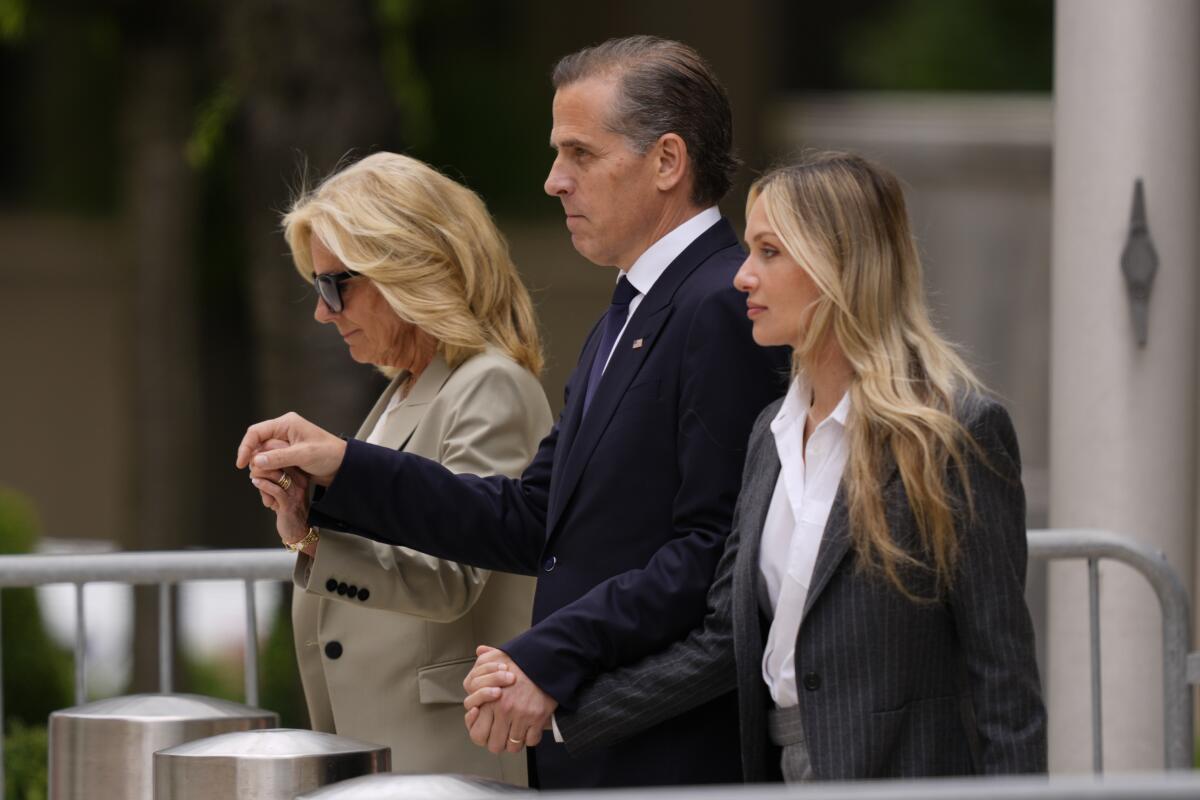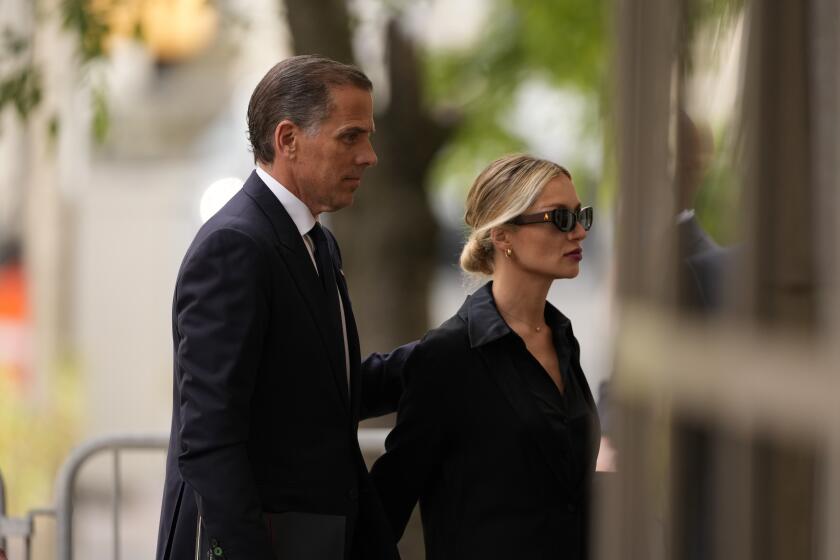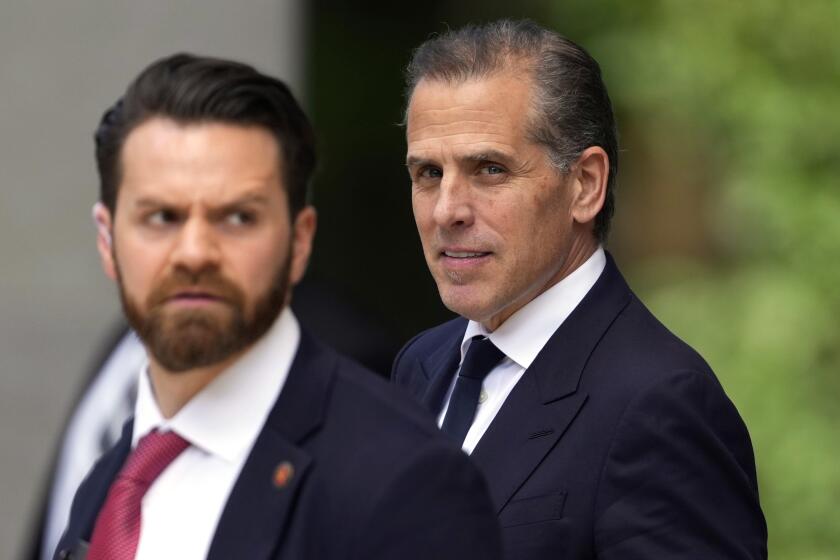Hunter Biden found guilty of three felony charges in gun case

- Share via
WILMINGTON, Del. — Hunter Biden, the president’s son, was convicted Tuesday of federal gun crimes, including lying about being drug-free when he purchased and briefly owned a gun while he was addicted to crack cocaine.
The guilty verdict, handed down by a jury in Delaware after about three hours of deliberations, capped a weeklong trial in which prosecutors elicited testimony from Biden’s ex-wife, an ex-girlfriend and his sister-in-law turned lover. All spoke in graphic detail about his addiction to drugs and alcohol, with First Lady Jill Biden often sitting in the front row.
Biden was on trial for three felony charges, and the jury convicted him of all three. In addition to lying on a federal background check form and giving a false statement to a federal firearms dealer, he was convicted of possessing a gun while being an illicit drug user.
As the verdict was read by Judge Maryellen Noreika’s clerk, Biden sat impassively. Afterward, he kissed his wife, Melissa Cohen Biden, and hugged his lawyer, Abbe Lowell.
The proceeding was swift, with the first lady reaching the courthouse only after the judge had dismissed the jurors. Wearing sunglasses, she walked toward the room where her stepson was huddled with other relatives and his legal team.
President Biden said he will “accept the outcome of the case and will continue to respect the judicial process” while his son considers an appeal of the verdict.
“Jill and I will always be there for Hunter and the rest of our family with our love and support. Nothing will ever change that,” he said in a statement.
Lowell said in a statement that he was “disappointed” by the jury’s decision and would “continue to vigorously pursue all the legal challenges available.”
Holding the hands of his stepmother and his wife, Hunter Biden, 54, left the J. Caleb Boggs Federal Building in downtown Wilmington without speaking to reporters. He issued a brief statement saying he was “more grateful today” for his wife and family’s support “than I am disappointed by the outcome.”
David Weiss, the special counsel appointed by Atty. Gen. Merrick Garland, said Tuesday afternoon that the case was about more than Hunter Biden’s well-documented drug and alcohol addiction.
“This case was about the illegal choices [the] defendant made while in the throes of addiction, his choice to lie on a government form when he bought a gun, and the choice to then possess that gun,” Weiss said. “No one in this country is above the law. Everyone must be accountable for his actions — even this defendant.”
Outside the courthouse, The Times spoke to two jurors — a 51-year-old woman from northern Delaware and a 68-year-old man from the southern half of the state. Speaking on condition of anonymity, both said there was clear evidence that Biden knowingly lied about his drug addiction in order to buy the gun.
Both said that Biden’s text messages from the time period, including telling his sister-in-law that he was “smoking crack,” were pivotal in reaching a decision. When deliberations began Monday afternoon, the panel was split 6-6, said the male juror. The number became 11-1 on Tuesday morning before the final juror decided the evidence showed Biden was guilty.
“I just think he needs help,” said the female juror, who called the trial “a waste of a taxpayer dollars,” adding, “I say fine him. I don’t think anyone who is a nonviolent drug addict should be in prison.”
Biden’s sentencing has not been scheduled, but the judge said it would probably take place in about 120 days. The charges carry a maximum penalty of 25 years in prison, but as a first-time offender, Biden would be unlikely to receive much, if any, time.
In an election year, the verdict was sure to be seized on by the president’s political opponents and to be spun as vindication for Republican leaders who last year criticized a plea deal on similar charges. The deal unraveled under questioning by Noreika — the same judge who presided over the trial — and prosecutors indicted Biden again.
Biden, who lives in Malibu, will face a second trial in Los Angeles in September on federal charges of tax evasion and failing to pay his taxes on time.
Tuesday’s verdict comes less than two weeks after his father’s opponent in the presidential election, Donald Trump, was convicted by a New York jury of falsifying business records in a scheme to illegally influence the 2016 election through hush money payments to an adult film actor who said the two had sex.
The president’s reaction was a sharp contrast to that of Trump, who has repeatedly attacked the judge overseeing the hush money case and decried the outcome as “rigged” by President Biden and his allies.
The male juror said that despite repeatedly noticing the first lady in the courtroom, he rarely thought of the fact that Hunter Biden was the president’s son.
“You are looking at him. You are looking at his family,” the juror said of the experience in court. But he said he “tried to block the rest of it out” because Biden “was just like everybody else.”
“It was not politically motivated. Politics played no part in this whatsoever. Again, we just went by the evidence,” the juror said.
In the theater of the courtroom, a trial where the prosecution’s star witnesses have been three of Hunter Biden’s former lovers, Melissa Cohen Biden’s role is singular and potent with the only audience that matters now — the jury.
The testimony the jurors heard was largely related to the question Biden answered on a background check form at a Delaware gun store on Oct. 12, 2018: “Are you an unlawful user of, or addicted to, marijuana or any depressant, stimulant, narcotic drug, or any other controlled substance?”
Biden checked “No.”
Lowell, the defense attorney, emphasized that his client had recently completed a rehab program in L.A. and lived with a sober companion in Nichols Canyon. The gun salesman did not perceive Biden to be under the influence or glassy-eyed, and no witness saw him using drugs in the days after, when he owned the Colt Cobra revolver.
Lowell contended that the gun was never fired and remained locked up until Hallie Biden, his brother’s widow, found it on the morning of Oct. 23, 2018, and in a panic, disposed of it in a trash bin outside a nearby grocery store. Biden, who was dating Hallie Biden at the time, urged her to retrieve the gun once he discovered it missing, asking her, “Are you insane?”
When Hallie Biden returned to the supermarket, the gun was gone from the trash can, and Biden instructed her to contact police.
But prosecutors told jurors that there was “overwhelming evidence” of Biden’s drug use in the years before and the months after the gun purchase.
Closing arguments are made in case of President Biden’s son, who faces three felony charges surrounding the possession of a firearm.
Over several days, prosecutors presented wrenching details. Biden’s ex-wife, Kathleen Buhle, testified that she found a crack pipe in 2015 at their home and would regularly search his car for drug paraphernalia. Zoe Kestan, a former girlfriend, told jurors about the night she met Biden at a Manhattan strip club, where she was working at the time.
Within minutes of going to a private room with him in 2018, she recalled, he began smoking crack. That night kicked off a bicoastal relationship in which the pair holed up in a string of luxury hotels — the SoHo Grand, the Mercer, Four Seasons in Manhattan, the Chateau Marmont and the Roosevelt in Hollywood — where he abused crack every 20 minutes and summoned dealers to feed his habit, Kestan testified.
“If this evidence did not establish that Hunter Biden is a crack addict and an unlawful user, then no one is a crack addict and an unlawful user,” said assistant special counsel Derek Hines in his closing argument.
After Hallie Biden asked him where he was in mid-October 2018, a day after buying the gun, Biden replied that he was “waiting for a dealer named Mookie” who hangs out at 7-Eleven in downtown Wilmington. Later, he told her that he was “smoking crack.”
The male juror noted that, according to testimony by an FBI agent, Biden was at the 7-Eleven in the general time period when he bought the gun. “What was he doing?” the juror said. “The defense wants us to believe that he was just there to buy a cup of coffee, but I didn’t buy that.”
Hallie Biden testified that she saw Hunter Biden either late in the night or early in the morning on Oct. 23, 2018, and that he looked exhausted. Inside his truck, she said, she discovered drug paraphernalia and “remnants” of crack cocaine, along with the gun. She put the gun inside a leather pouch that she said she found in his vehicle — the same pouch that federal investigators tested last year, finding trace amounts of cocaine.
Under cross-examination by Lowell, Hallie Biden’s memory appeared shaky at times — she couldn’t say what “paraphernalia” she found in the car, and she acknowledged that Biden often lied to her about his whereabouts. She also said she did not see Biden use drugs in this time period.
But her testimony seemed to undercut defense attorneys’ contention that he was in a period of sobriety when he owned the revolver.
“He said he was ‘smoking crack,’” Hines reminded jurors in his closing argument. Pointing to this and Biden’s candid 2021 memoir, “Beautiful Things,” which offers a searing account of his addiction to crack and subsequent recovery, Hines said: “Believe his words in his book because he knew ... he was an addict and an unlawful user.”
More to Read
Sign up for Essential California
The most important California stories and recommendations in your inbox every morning.
You may occasionally receive promotional content from the Los Angeles Times.












